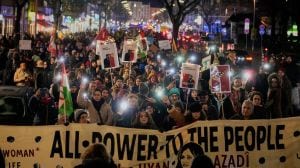Watch thy neighbour
Is Pakistan a credible partner in the peace process any more? Is Musharraf a credible interlocutor?

Prime Minister Manmohan Singh8217;s reluctance to name Pakistan in his address to the nation on Wednesday night, one hopes, does not imply that it is business as usual in the peace process. Although the foreign office underscored the importance of Pakistan ending cross-border terrorism, the government might be severely underestimating the rapidly eroding political support in the nation to the peace process. For many months, the expanding scale of terrorist violence, from Delhi to Doda and Bangalore to Benares, had shown some clear trends. That it is no longer limited to J038;K. That it is focused on the most vulnerable civilian targets. That it was aimed at provoking communal violence. That it was about blackmailing India on Kashmir. Yet, India chose to believe all this should not come in the way of an engagement with Pakistan.
The emboldened terrorist groups and their sponsors in Pakistan have seen through New Delhi8217;s pretense for what it is 8212; the UPA government8217;s lack of political resolve. Mumbai blasts are a tipping point. Even the government, which has revelled in a 8216;do nothing policy8217; towards Pakistan, will find the peace process unsustainable. The doubts, if any, on the new threats to the peace process, were removed by Pakistan Foreign Minister Khurshid Mehmood Kasuri. In suggesting that terrorism in India will not cease without a resolution of the J038;K question, Kasuri has only read aloud the writing on the wall that the UPA government refuses to read.
India needs to look hard at the man who claims to embody Pakistan8217;s 8220;quest8221; for reasonable solutions. For some time now, Pervez Musharraf has been seen in India as someone it can do business with. But he has failed to keep his word on ending cross-border terrorism. So India must ask itself whether he is any longer a credible interlocutor. Remember his double talk and double deals in Afghanistan with his principal benefactor, the US? Not surprisingly, he refuses to act straight with India. As India looks for pressure points against Musharraf, there may be nothing more important than openly supporting the democratic movement that appears to be gathering momentum in Pakistan.
- 01
- 02
- 03
- 04
- 05






























